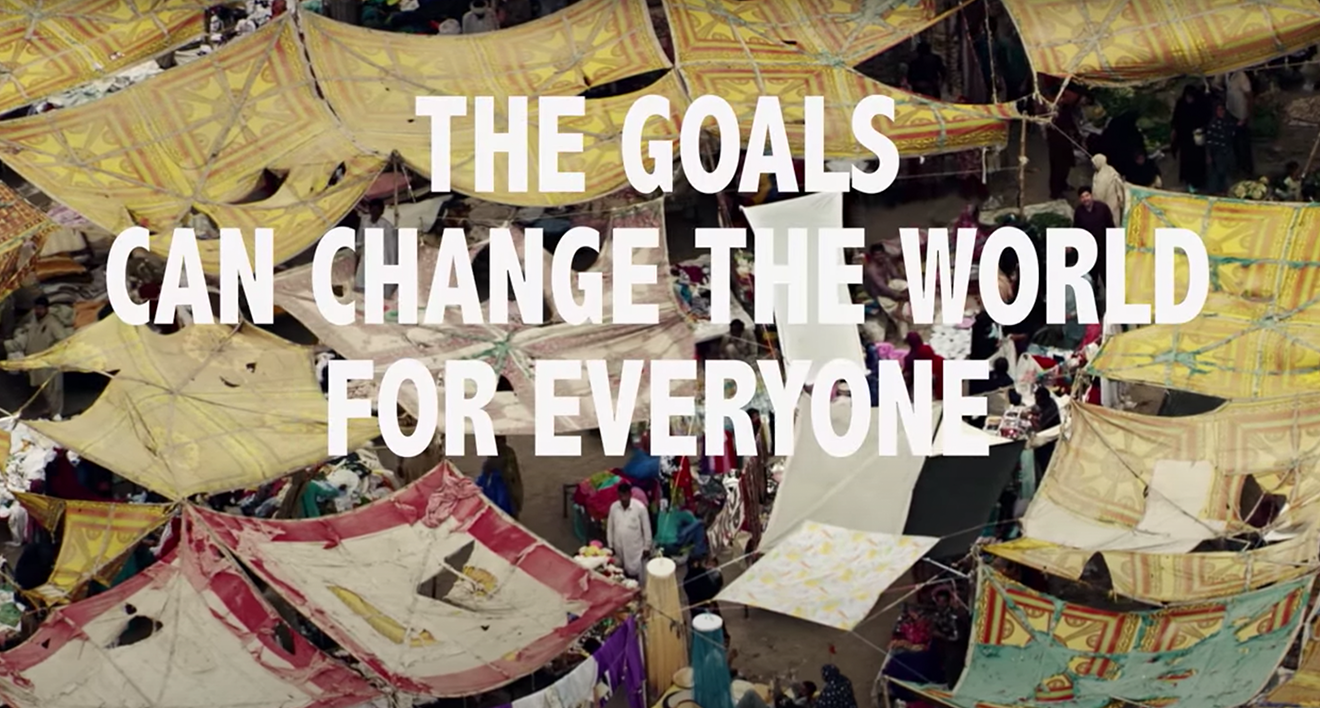Leave No One Behind

Project
Leave No One BehindPartners
CIVICUS and Development InitiativesThe Brief
When world leaders signed up to the Global Goals, they promised to ensure that ‘no one is left behind’. That’s because, although we have made huge progress towards a better world, too many people have been left behind as a result of who they are or where they live. To turn this pledge from words to reality, Project Everyone joined forces with CIVICUS and Development Initiatives, in July 2016 – with the support of the UK’s Department for International Development – to establish the Leave No One Behind (LNB) Partnership.
Leading on the ‘engagement’ portion of the Partnership, Project Everyone created content to engage people around the world and tell the stories of those who are being left behind.

The Approach
TITLE AREA
The Leave No One Behind film was created to bring the concept of Leave No One Behind to life. Using scenes from Yann Arthus-Bertrand’s film ‘HUMAN’, this powerful film tells an emotional story around the world’s most disadvantaged, giving voice to some of the most marginalized people and inspiring action for a better world. The film was launched in front of world leaders at the opening of the UN General Assembly, in September 2016 and was shown at events around the world.
Ahead of the 2017 High Level Political Forum, the LNB Partnership joined forces with UN Women for the Leave No Woman or Girl Behind campaign. For this, Project Everyone created a series of short awareness raising films spotlighting many of the issues affecting women and girls who are at risk of being left behind in Africa and around the world. They powerfully tell the stories of women and girls across Kenya who are facing different aspects of poverty, exclusion and discrimination

Leave no one behind (LNOB) represents the unequivocal commitment of all UN Member States to eradicate poverty in all its forms, end discrimination and exclusion, and reduce the inequalities and vulnerabilities that leave people behind and undermine the potential of individuals and of humanity as a whole”
The Impact
TITLE AREA
The final output produced for the Partnership was a data visualization tool created to support on and offline campaign efforts on Leave No One Behind. The data visualization platform allows you to create your own campaign materials, making them adaptable to each individual context. The tool can be used to create Twitter graphics or posters for Goals 1-5. Users can input their own data into the images, generating campaign assets tailored to an international, national or regional audience. The data visualization platform is currently available in English, Spanish, French and Swahili.
To cap things off, we presented the Leave No One Behind Award to Felix Manyogote, during the 2017 Global Goals Awards which took place at the same time as the UN General Assembly. Felix is a social entrepreneur and medical student dedicating his life to help others. Through his project MAMA AFYA he provides free maternal and newborn health services, distributes free clean delivery and newborn kits and develops an effective line distribution so that women are connected irrespective of their location.
OTHER WORK
The SDG Pavilion, UNGA 2023
The SDG Pavilion was a versatile, semi-permanent artistic structure, set within the iconic grounds of United Nations Headquarters in New York, designed in collaboration with global artists with sustainability and diversity at its heart.
read moreHALFTIME CAMPAIGN
September 2023 marked the halfway point for the Sustainable Development Goals.
read moreGLOBAL GOALS WEEK AT EXPO 2020 DUBAI
Expo 2020 Dubai was an opportunity to convene the global community and drive collective progress towards the SDGS.
read moreTHE WORLD’S TO DO LIST
The World’s To Do list launched on 20th September 2021, as part of the annual Global Goals and UN General Assembly weeks, via a range of high impact, public facing physical and digital activations.
read moreThe Goals on Fifth Avenue
For 17 days, Fifth Avenue visitors and passers-by were invited to discover the Goals through a series of 17 pillars installed between 49th and 58th street.
read moreForest for Change
As part of the third London Design Biennale, Project Everyone collaborated with artist Es Devlin, Artistic Director of LDB, to take over the iconic courtyard space at the centre of Somerset House
read moreChoose Life
Launched on 2 October 2020, Choose Life is a call for meaningful and ambitious climate action from the UK government as we recover from the pandemic.
read moreNations United
The aim was to create a film, a unique 30-minute global broadcast to mark the 75th anniversary of the United Nations and the 5th anniversary of the Sustainable Development Goals.
read moreWorld’s Largest Lesson
During the COVID-19 outbreak, when so many children are learning at home, World’s Largest Lesson and UNICEF have created a distance-learning YouTube show.
read moreBusiness Avengers
The Business Avengers comprise some of the world’s largest and most influential companies, all of which are committed to playing a significant role in achieving the Global Goals.
read moreDear World Leaders
The letter was launched in January of 2020. At the start of the critical year, 20 of the world’s most iconic and leading activists- from Nobel laureates Malala Yousafzai and Nadia Murad,
read moreGoalkeepers Global Goals Awards
In partnership with the Bill & Melinda Gates Foundation, the Goalkeepers, Global Goals Awards are an annual recognition of remarkable individuals
read moreGoalkeepers
Launched in 2017 in partnership with the Bill and Melinda Gates Foundation, Goalkeepers is a multiyear campaign dedicated to accelerating progress towards the U.N Sustainable Development Goals.
read moreBringing the Global Goals to London Tech Week
Between the 10th and 12th June 2019, over 20,000 delegates from 98 countries passed through London's Kings Cross to attend the CogX Festival of AI and Emerging Technology
read moreInternational Day of the Girl 2017
On October 11th, Project Everyone launched the #FreedomForGirls campaign for International Day of the Girl, in partnership with UNICEF
read more